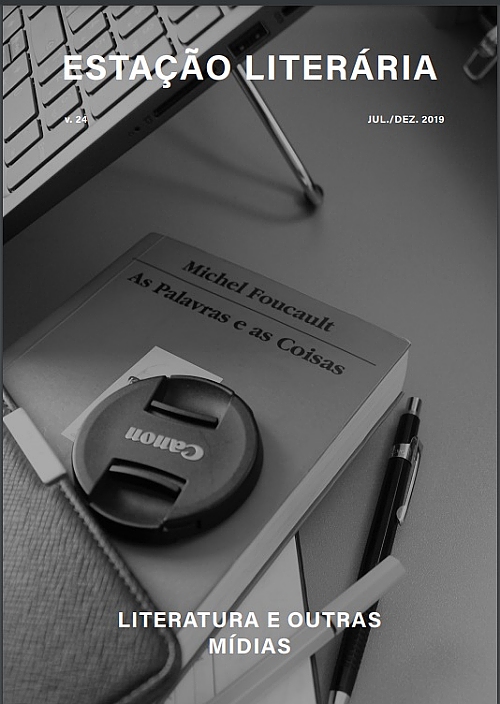An India for Westerners? The diasporic poetology of Salman Rushdie and Deepa Metha in Midnight's Children
DOI:
https://doi.org/10.5433/el.2019v24.e38227Keywords:
Adaptation, Midnight's Children, Western audience.Abstract
This paper examines Deepa Mehta's film Midnight's Children, drawing from the theories of Patrick Cattrysse's (2014) descriptive adaptation studies and André Lefevere's (2007) notion of poetology. We seek to understand, through the approach of the first theorist, how film analysis should take into consideration the target context of the adaptation of a work; we draw on the second theorist to examine the poetology of the creators; finally, we examine how the concept of Orientalism in art can also be produced by non-Westerners, and the implications of this phenomenon for literature and film.
Downloads
References
ANDREW, Edgar e SEDGWICK, Peter. Cultural Theory: the Key Concepts. New York: Routledge, 2008.
BORGES, Telma. A escrita bastarda de Salman Rushdie. 2006. Tese (Doutorado) - Universidade Federal de Minas Gerais, Belo Horizonte, 2006.
BOSE, Derek. Produção e distribuição do cinema indiano. In: MELEIRO, Alessandra. Cinema no mundo, Ásia: indústria política e mercado. São Paulo: Escrituras, 2007.
BURTON, David F. Fire, Water and The Goddess: The Films of Deepa Mehta and Satyajit Ray as Critiques of Hindu Patriarchy. Journal of Religion & Film, v. 17, 2013.
CARDOSO, Joana Amaral. Salman Rushdie diz que o filme Os Filhos da Meia-Noite fecha o ciclo da fatwa. Cultura Ípsilon, Portugal, 24 Abr, 2013. Disponível em: https://www.publico.pt/2013/04/24/culturaipsilon/noticia/salman-rushdie-joseph-anton-pode-ser-adaptado-para-o-cinema-1592334.
CATRYSSE, Patrick. Descriptive adaptation: epistemological and Methodological Issues. Antwep: Garant, 2014.
CHRISTIAN, Diane & JACKSON, Bruce. Deepa Metha, Water. The Buffalo Film Seminars. New York, 2010.
DIAMOND, Marie-Josephine. Encyclopedia of World Writers: 9th and 20th Centuries. New York: Facts On File, Inc, 2005.
DRABBLE, Margaret. Oxford Companion to English Literature. Oxford: Oxford University Press, 2000.
ENCYCLOPEDIA OF WORLD BIOGRAPHY. Deepa Metha Biography. Disponível em: http://www.notablebiographies.com/supp/Supplement-Ka-M/Mehta-Deepa.html
EVEN-ZOHAR, Itamar. Teoria dos polissistemas. Revista Translatto, n. 4, 2013.
KHORANA, Sukhmani. 'Maps and movies: talking with Deepa Mehta'. Bright Lights Film Journal, vol. 63, February, 2009.
LEFEVERE, André. Tradução, reescrita e manipulação da fama literária. Bauru: EDUSC, 2007.
MALAMUD, Rahul. 'Midnight's Children' Flourishes on Screen. The Chronicle Review. October, v. 12, 2012.
MENDES, Ana Cristina. The Empire on Film: Recasting India from th Raj revival Lagaan. In: FERREIRA, J. Carlos Viana & MALAFAIA, Teresa de Ataíde (org.). A Tangled Web: Ideas, Images, Symbols. Lisboa: Colibri, 2007.
MORI, Toshie. All for Money: Mizoguchi Kenji's Osaka Elegy (1936). PHILLIPS, Alastair & STRINGER, Julian (orgs.). Japanese Cinema: Texts and Contexts. New York: Routledge, 2007.
NAIN, P.P.R. A Dissent on "Fire".The Toronto Review, 18.1, fall, 1999.
RUSHDIE, Salman. Introdução. The Toronto Review. Os filhos da meia-noite. São Paulo: Cia das Letras, 2006.
RUSHDIE, Salman. Joseph Anton: memórias. São Paulo: Cia das Letras, 2012.
RUSHDIE, Salman. Midnight's Children: London: Vintage, 1995.
SAID, Edward. Cultura e Imperialismo. São Paulo: Cia das Letras, 2011.
SAID, Edward. Orientalismo: o Oriente como invenção do Ocidente. São Paulo: Cia das Letras, 1990.
SHOHAT, Ellen & STAM, Robert. Crítica da imagem eurocêntrica: multiculturalismo e representação. São Paulo: Cosac Naify, 2006.
TOOR, Saadia. Indo-chic: The Cultural Politics of Consumption in Postliberalization India. SOAS: Literary Review, n. 2, 2000.
Downloads
Published
How to Cite
Issue
Section
License
Copyright (c) 2020 Estação Literária

This work is licensed under a Creative Commons Attribution 4.0 International License.
A revista se reserva os direitos autorais sobre as contribuições publicadas, sem retribuição material para o autor, podendo disponibilizá-las on-line no modo Open Access, mediante sistema próprio ou de outros bancos de dados; também poderá efetuar, nos originais, alterações de ordem normativa, ortográfica e gramatical, com o intuito de manter o padrão culto da língua, contando com a anuência final dos autores. As opiniões emitidas pelos autores são de sua exclusiva responsabilidade.













